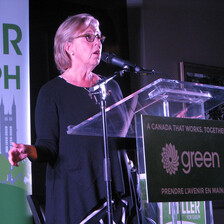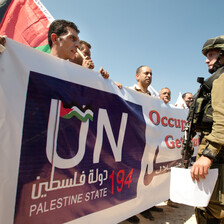The Electronic Intifada 14 December 2012

Canada’s training of Palestinian security forces is to the benefit of Israel.
APA imagesFew aspects of Canadian foreign policy have been mentioned more times over the past two weeks than Ottawa’s $300 million five year “aid” program to the Palestinian Authority.
The Globe and Mail reported last month that Prime Minister Stephen Harper threatened Mahmoud Abbas, the PA leader, that “there will be consequences” if he followed through on his plan to ask the UN General Assembly to upgrade Palestine’s status.
Since then, there has been a great deal of speculation about whether Canadian “aid” would be cut off (“Harper took steps to stifle Palestinian statehood bid,” 26 November 2012). A quick Google search brings up hundreds of articles mentioning the $300 million dollars in funding yet none of them mention the highly politicized character of this “aid.”
Israel vets everything
After Hamas won legislative elections in January 2006 the Conservatives made Canada the first country (after Israel) to cut off funding to the Palestinian Authority. When Hamas officials were ousted from the Palestinian unity government in June 2007, the Conservatives immediately contributed $8 million “in direct support to the new government.” Then in December 2007 the Conservatives announced a five-year $300 million aid program to the Palestinians, which was largely designed to serve Israel’s interests.
As a Saint John Telegraph-Journal headline explained: “Canada’s aid to Palestine benefits Israel, foreign affairs minister says.” In January 2008 Maxime Bernier, then Canada’s foreign minister, said: “We are doing that [providing aid to the PA] because we want Israel to be able to live in peace and security with its neighbors” (“Bernier stands firm in support of Israel,” Jewish Tribune, 23 January 2008).
Most of the Canadian aid money has gone to building up a Palestinian security force overseen by a US general. The immediate impetus of the Canadian aid was to create a Palestinian security force “to ensure that the PA maintains control of the West Bank against Hamas,” as Canadian Ambassador to Israel Jon Allen was quoted as saying by the Canadian Jewish News.
American General Keith Dayton, in charge of organizing a 10,000-member Palestinian security force, even admitted that he was strengthening Mahmoud Abbas’ Fatah against Hamas, telling a US audience in May 2009 his force was “working against illegal Hamas activities.” According to Al Jazeera, between 2007 and early 2011 PA security forces arrested some 10,000 suspected Hamas supporters in the West Bank (“Dayton’s mission: A reader’s guide,” 25 January 2011).
The broader aim of the US-Canada-Britain initiated Palestinian security reform was to build a force to patrol the West Bank and Gaza. In a 2011 profile of Canadian Lieutenant-Colonel Ron Allison, “Dayton’s chief of liaison in the West Bank” for a year, Allison’s hometown newspaper Times & Transcript aptly reported: “The Dayton team was concerned with enhancing security on the West Bank of Palestine and was all geared towards looking after and ensuring the security of Israel.”
“We don’t provide anything to the Palestinians,” Dayton told the Associated Press in June 2009, “unless it has been thoroughly coordinated with the State of Israel and they agree to it.” For instance, Israel’s notorious internal intelligence agency, the Shin Bet, vets all of the Palestinian recruits, according to US government reports (US Security Assistance to the Palestinian Authority, Congressional Research Service, 9 January 2010).
Shielding settlers
The Israelis supported Dayton’s force as a way to keep the West Bank population under control. Like all colonial authorities throughout history, Israel looked to compliant locals to take up the occupation’s security burden.
Writing in a the London Review of Books, Adam Shatz last year referred to how PA security forces stopped a group of their fellow Palestinians from taking part in a protest at the Huwwara checkpoint near Nablus. The May 2011 protest was held to commemorate the Nakba, the ethnic cleansing that led to Israel’s establishment in 1948.
“It is an extraordinary arrangement: the security forces of a country under occupation are being subcontracted by third parties outside the region to prevent resistance to the occupying power, even as that power continues to grab more land,” Shatz wrote. “This is, not surprisingly, a source of considerable anger and shame in the West Bank” (“Is Palestine next?”).
Dayton’s “eyes and ears”
The Palestinian security force is largely trained in Jordan at the US-built International Police Training Center (established to train Iraqi security after the 2003 invasion).
In October 2009 The Wall Street Journal reported: “[Palestinian] recruits are trained in Jordan by Jordanian police, under the supervision of American, Canadian and British officers. (“Palestinian support wanes for American-trained forces,” 15 October 2009). The number of military trainers in the West Bank varied slightly but in mid-2010, eighteen Canadian troops worked with six British and ten US soldiers under Dayton’s command (“Israel’s ‘new best friend’?” Al Jazeera English, 29 May 2010).
“The Canadian contribution is invaluable,” explained Dayton to The Maple Leaf, the monthly publication of the Canadian army. Canadians are particularly useful because, Dayton said, “US personnel have travel restrictions when operating in the West Bank. But, our British and Canadian members do not.”
Calling them his “eyes and ears” Dayton added: “The Canadians … are organized in teams we call road warriors, and they move around the West Bank daily visiting Palestinian security leaders, gauging local conditions” (“Operation PROTEUS: Building a Palestinian security force,” 17 February 2010).
Part of the US Security Coordinator office in Jerusalem, the Canadian military mission in the West Bank (dubbed Operation PROTEUS) includes Royal Canadian Mounted Police officers as well as officials from the foreign ministry, Justice Canada and the Canadian Border Services Agency.
In a September 2010 interview with The Jerusalem Post, Peter Kent, then Canada’s deputy foreign minister, said Operation PROTEUS was Canada’s “second largest deployment after Afghanistan” and it receives “most of the money” from the five-year $300 million Canadian “aid” program to the PA (“Canada’s continuous commitment,” 15 September 2010).
During a visit to the Middle East earlier this year, John Baird, the current foreign minister, told The Globe and Mail he was “incredibly thrilled” by the West Bank security situation, which he said benefited Israel (“Canadian ministers take firm line with Palestinians,” 30 January 2012).
In effect, Canada has helped to build a security apparatus to protect a corrupt PA led by Mahmoud Abbas, whose electoral mandate expired in January 2009, but whom the Israeli government prefers over Hamas.
Don’t expect the Conservative government to sever this “aid.”
Yves Engler is the author of the 2010 book Canada and Israel: Building Apartheid. His most recent is The Ugly Canadian: Stephen Harper’s Foreign Policy. His website is yvesengler.com.






Comments
As a Canadian, I'm truly ashamed that we're financing occupation
Permalink everett coldwell replied on
In Canadian media, we hear Harper's government is sending 'aid' to Palestine.
Paying for Israeli vetted and controlled security forces is not my idea of 'aid', but instead is helping to finance an illegal occupation.
attack dog
Permalink Eric replied on
Harper's neo-Conservative government in the last six years has been dedicated to destroying the mostly false image of Canada as a benign or moderate country. As Engler suggests, it has become the most pro-Israel and pro-Netanyahu government in the world. Harper is like a vicious dog on a leash, straining to bite and bark at perceived enemies of its master -- sometimes even when the US and Israel act more moderately, at least for appearances' sake.
Harper has been equally effective at destroying any idea around the world that Canada cares about the environment. At least he's consistent ...
How much actually ends up in the west bank
Permalink wes wart replied on
I wonder how much money actually goes to Palestinians. I would not be surprised if a sum goes to Shin Bet for their service of vetting/screening the recruits to the Palestinian force. The Canadian and British officers that supervise the training probably get a healthy salary along with American general heading the force. The Jordanians are also getting a good slice of it through hosting the show and training the recruits. This is not aid.
Well, actually it is aid...it
Permalink anna replied on
Well, actually it is aid...it is just aid given to Israel and not to Palestinians - as the government claims.
The money does provide aid. What the Canadian government ibeing dishonest about is who this aid is benefiting.
Not very surprising from the Harper crowd.